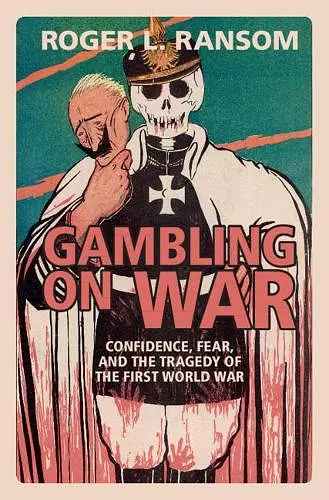Gambling on War
Confidence, Fear, and the Tragedy of the First World War
Format:Hardback
Publisher:Cambridge University Press
Published:28th Jun '18
Currently unavailable, and unfortunately no date known when it will be back
This hardback is available in another edition too:
- Paperback£24.99(9781108454353)

Discusses the irrational, risk-taking decisions of overconfident leaders which led to a seminal turning point in world history that shaped the twentieth century.
The First World War left a legacy of chaos that is still with us a century later. Why did European leaders resort to war and why did they not end it sooner? Roger L. Ransom sheds new light on this enduring puzzle by integrating economics and history.The First World War left a legacy of chaos that is still with us a century later. Why did European leaders resort to war and why did they not end it sooner? Roger L. Ransom sheds new light on this enduring puzzle by employing insights from prospect theory and notions of risk and uncertainty. He reveals how the interplay of confidence, fear, and a propensity to gamble encouraged aggressive behavior by leaders who pursued risky military strategies in hopes of winning the war. The result was a series of military disasters and a war of attrition which gradually exhausted the belligerents without producing any hope of ending the war. Ultimately, he shows that the outcome of the war rested as much on the ability of the Allied powers to muster their superior economic resources to continue the fight as it did on success on the battlefield.
'World War I became a tragedy when victory became an end in itself rather than a means of achieving some prewar objective. In his lucid and insightful Gambling on War, Roger L. Ransom draws on history and economics to explain why that happened, why World War I upended the world's institutions, and why its tragic effects persist even today.' Philip T. Hoffman, author of Why Did Europe Conquer the World?
'The First World War remains with us. Ransom, an economic historian, places it within an age of extremes that ran from Bismarck to Clemenceau. The war resolved no rivalries. It led to no new normalcy. The book jars the reader into that reality. It shocks. It angers. It is a must-read.' Holger H. Herwig, author of The First World War: Germany and Austria-Hungary 1914–1918
'Economists think of people as rational but this is belied by experience. From that perspective, economic historian Roger L. Ransom shows persuasively how over-confidence, fear and reckless gambles make sense of a sequence of bad decisions that led to the First World War, and to catastrophic outcomes that nobody planned for.' Avner Offer, author of The First World War: An Agrarian Interpretation
'The general interest reader learns a lot, and about many things. … a great read for general interest readers with a standard background in economics … It should also have its place as a core reading for an undergraduate course on the economics of war.' Victor Gay, EH.Net
'The great strength of the book is the application of behavioral economic theories to decision-making in the First World War. It offers a variation on the argument that the war swept away the restrained political mores of the late nineteenth century. Once one power 'speculated' by initiating aggression, others had to react, and this changed expectations of future behavior, creating a path dependency toward the Second World War.' William Mulligan, H-Diplo
ISBN: 9781108485029
Dimensions: 235mm x 155mm x 20mm
Weight: 680g
346 pages